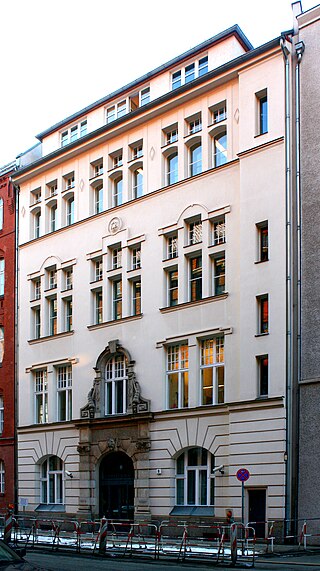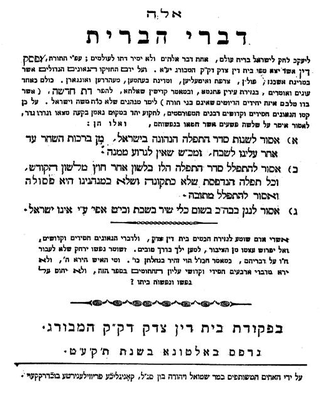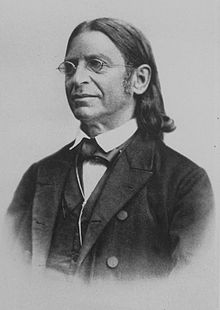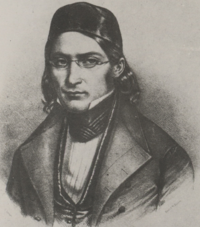
Abraham Joshua Heschel was a Polish-American rabbi and one of the leading Jewish theologians and Jewish philosophers of the 20th century. Heschel, a professor of Jewish mysticism at the Jewish Theological Seminary of America, authored a number of widely read books on Jewish philosophy and was a leader in the civil rights movement.

Orthodox Judaism is the collective term for the traditionalist branches of contemporary Judaism. Theologically, it is chiefly defined by regarding the Torah, both Written and Oral, as revealed by God to Moses on Mount Sinai and faithfully transmitted ever since.

Reform Judaism, also known as Liberal Judaism or Progressive Judaism, is a major Jewish denomination that emphasizes the evolving nature of Judaism, the superiority of its ethical aspects to its ceremonial ones, and belief in a continuous revelation which is closely intertwined with human reason and not limited to the theophany at Mount Sinai. A highly liberal strand of Judaism, it is characterized by little stress on ritual and personal observance, regarding Jewish law as non-binding and the individual Jew as autonomous, and by a great openness to external influences and progressive values.

Leopold Zunz was the founder of academic Judaic Studies, the critical investigation of Jewish literature, hymnology and ritual. Zunz's historical investigations and contemporary writings had an important influence on contemporary Judaism.

Zecharias Frankel, also known as Zacharias Frankel was a Bohemian-German rabbi and a historian who studied the historical development of Judaism. He was born in Prague and died in Breslau. He was the founder and the most eminent member of the school of positive-historical Judaism, which advocates freedom of research while upholding the authority of traditional Jewish belief and practice. This school of thought was the intellectual progenitor of Conservative Judaism.

Samuel Holdheim was a German rabbi and author, and one of the more extreme leaders of the early Reform Movement in Judaism. A pioneer in modern Jewish homiletics, he was often at odds with the Orthodox community.
Liberal Judaism is one of the two WUPJ-affiliated denominations in the United Kingdom founded by Claude Montefiore. It is smaller and more radical in comparison with the other one, the Movement for Reform Judaism. It is considered ideologically closer to American Reform Judaism than it is to the British Reform movement. As of 2010 it was the fourth largest Jewish religious group in Britain, with 8.7% of synagogue-member households.

Azriel Hildesheimer was a German rabbi and leader of Orthodox Judaism. He is regarded as a pioneering moderniser of Orthodox Judaism in Germany and as a founder of Modern Orthodox Judaism.

The Union progressiver Juden in Deutschland is a "Körperschaft des öffentlichen Rechts", a publicly chartered association, founded in 1997 as the congregational arm of Liberal Judaism in Germany. It is headed by Irith Michelsohn and has around 5,200 members. It is an affiliate of the World Union for Progressive Judaism. Rabbi Walter Homolka was former President and was also the most senior rabbinic figure associated with the UPJ, and the Abraham-Geiger-Kolleg serves as rabbinical seminary since 1999.

Heinrich Graetz was a German exegete and one of the first historians to write a comprehensive history of the Jewish people from a Jewish perspective.
"Wissenschaft des Judentums" refers to a nineteenth-century movement premised on the critical investigation of Jewish literature and culture, including rabbinic literature, to analyze the origins of Jewish traditions.

Hochschule für die Wissenschaft des Judentums, or Higher Institute for Jewish Studies, was a rabbinical seminary established in Berlin in 1872 and closed down by the Nazi government of Germany in 1942. Upon the order of the government, the name was officially changed to Lehranstalt für die Wissenschaft des Judentums.
Jakob Guttmann was a German-Jewish philosopher of religion (Religionsphilosoph) and rabbi. He officiated as chief rabbi of the Land rabbinate of Hildesheim between 1874 and 1892. Thereafter he served as rabbi in Breslau until his death.
Julius Guttmann, born Yitzchak Guttmann, was a German-born rabbi, Jewish theologian, and philosopher of religion.
Abraham Geiger College is a rabbinic seminary at the University of Potsdam in Potsdam, Germany.
Susannah Heschel is an American scholar and professor of Jewish studies at Dartmouth College. The author and editor of numerous books and articles, she is a Guggenheim Fellow Heschel's scholarship focuses on Jewish and Christian interactions in Germany during the nineteenth and twentieth centuries.
Monatsschrift für die Geschichte und Wissenschaft des Judenthums was a monthly journal devoted to the Science of Judaism. It was founded by Zecharias Frankel in Dresden in 1851, following the suppression of Zeitschrift für die Religiösen Interessen des Judenthums in 1846. It was published in Germany for 83 years between 1851 and 1939 In time, it became the leading journal in the Jewish academic world.
Leopold Jakob Jehuda Treitel was a German Jewish classical scholar in the late 19th and early 20th century, and the last rabbi of the Jewish community in the town of Laupheim, then Württemberg, Southern Germany.

The Hamburg Temple disputes were the two controversies which erupted around the Israelite Temple in Hamburg, the first permanent Reform synagogue, which elicited fierce protests from Orthodox rabbis. The events were a milestone in the coalescence of both modern perceptions of Judaism. The primary occurred between 1818 and 1821, and the latter from 1841 to 1842.

Heinemann Vogelstein was a German rabbi and leader of Reform Judaism in Germany.














